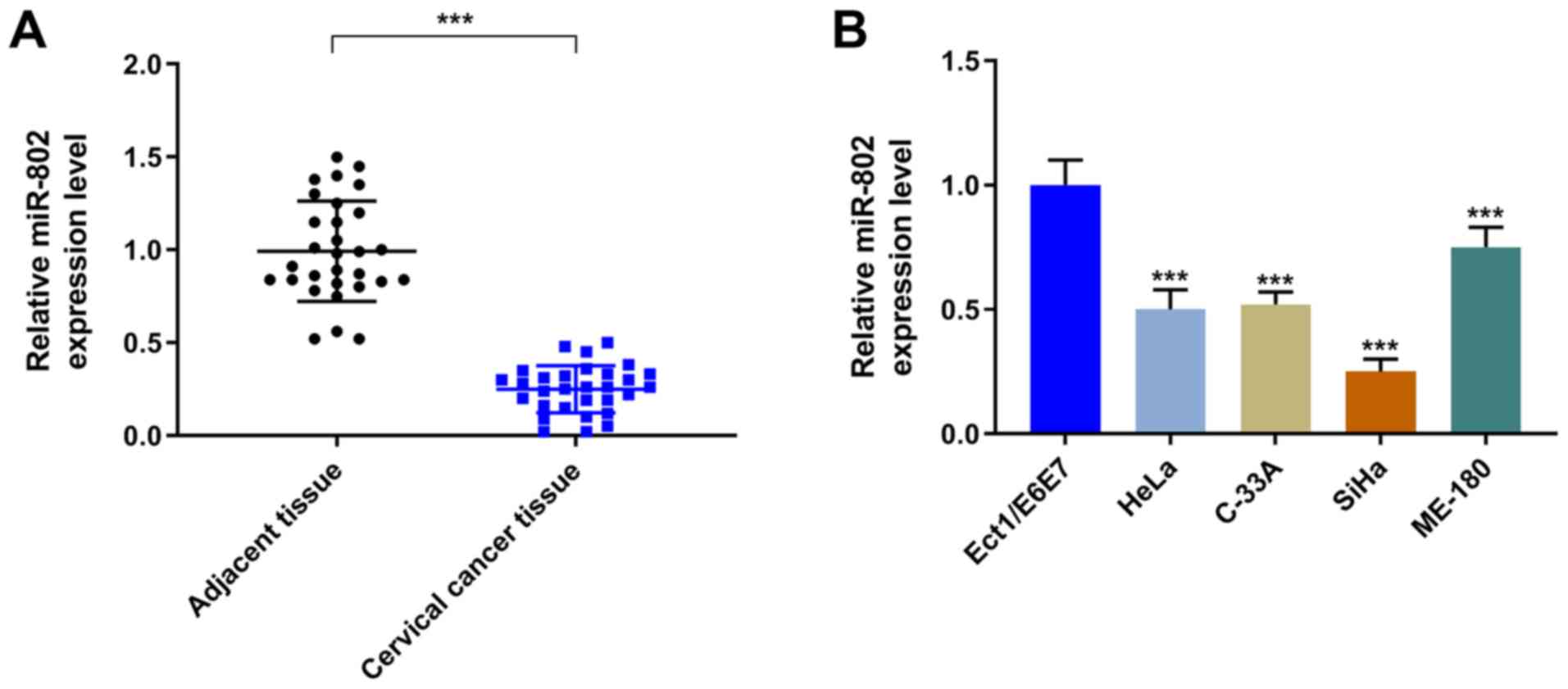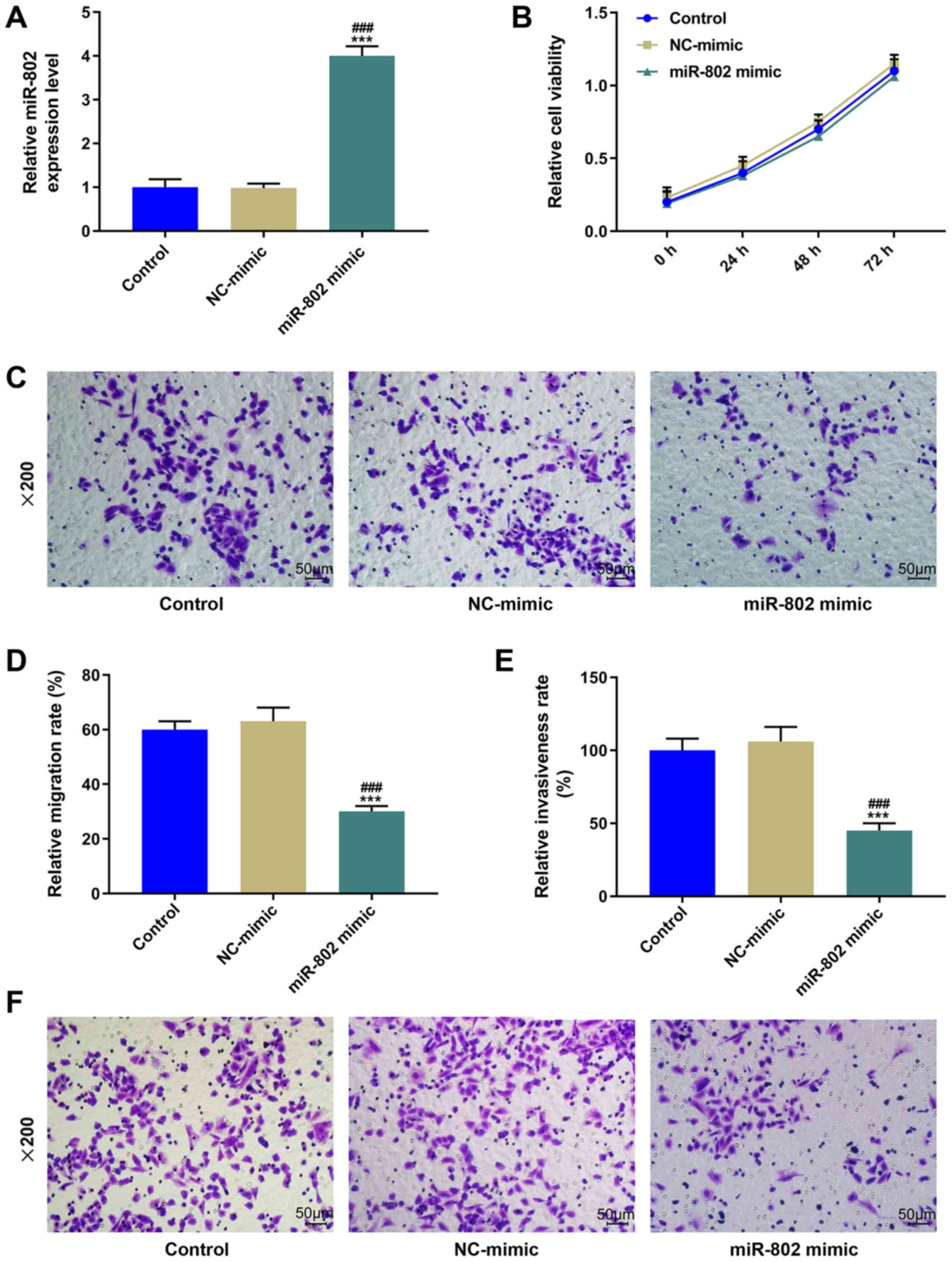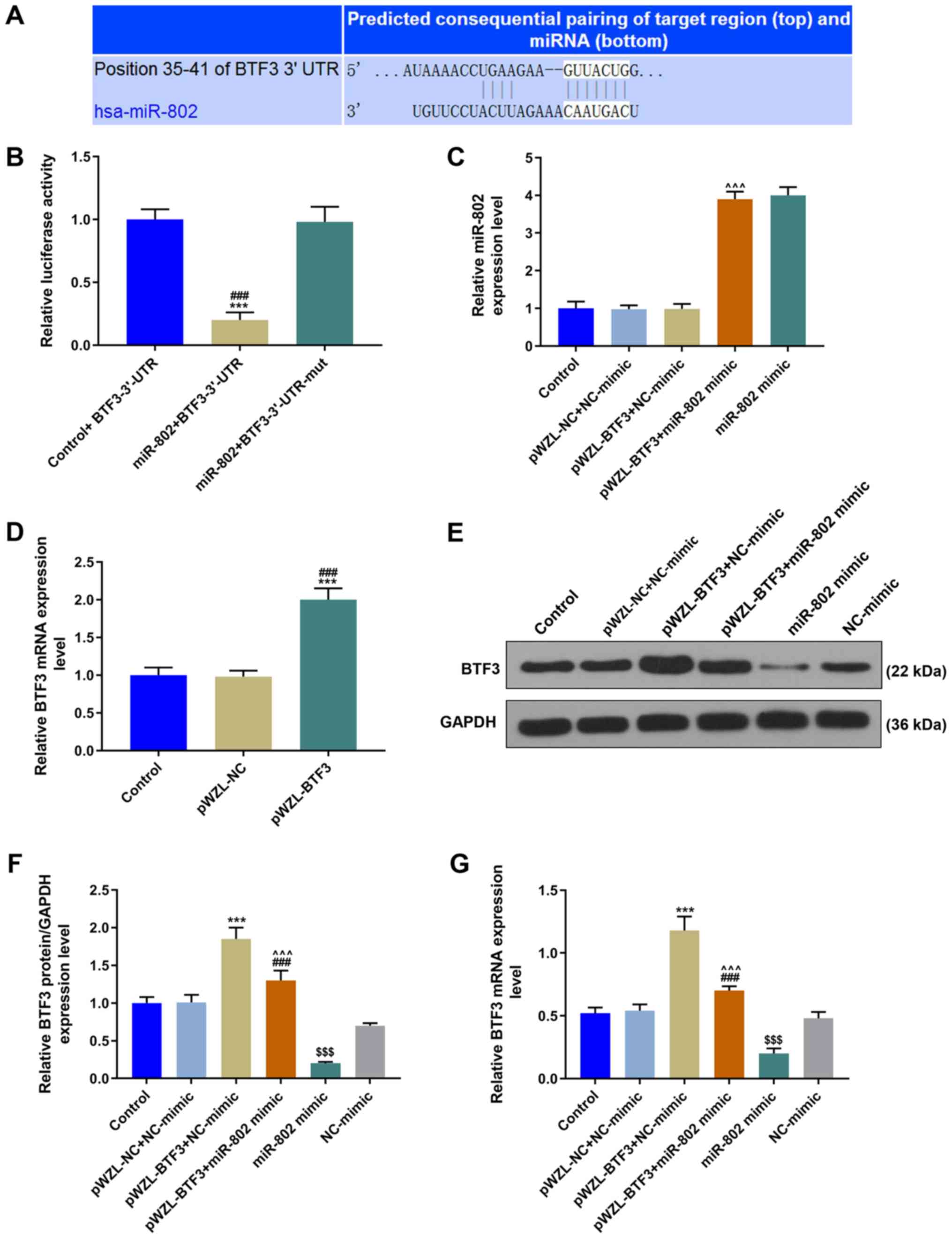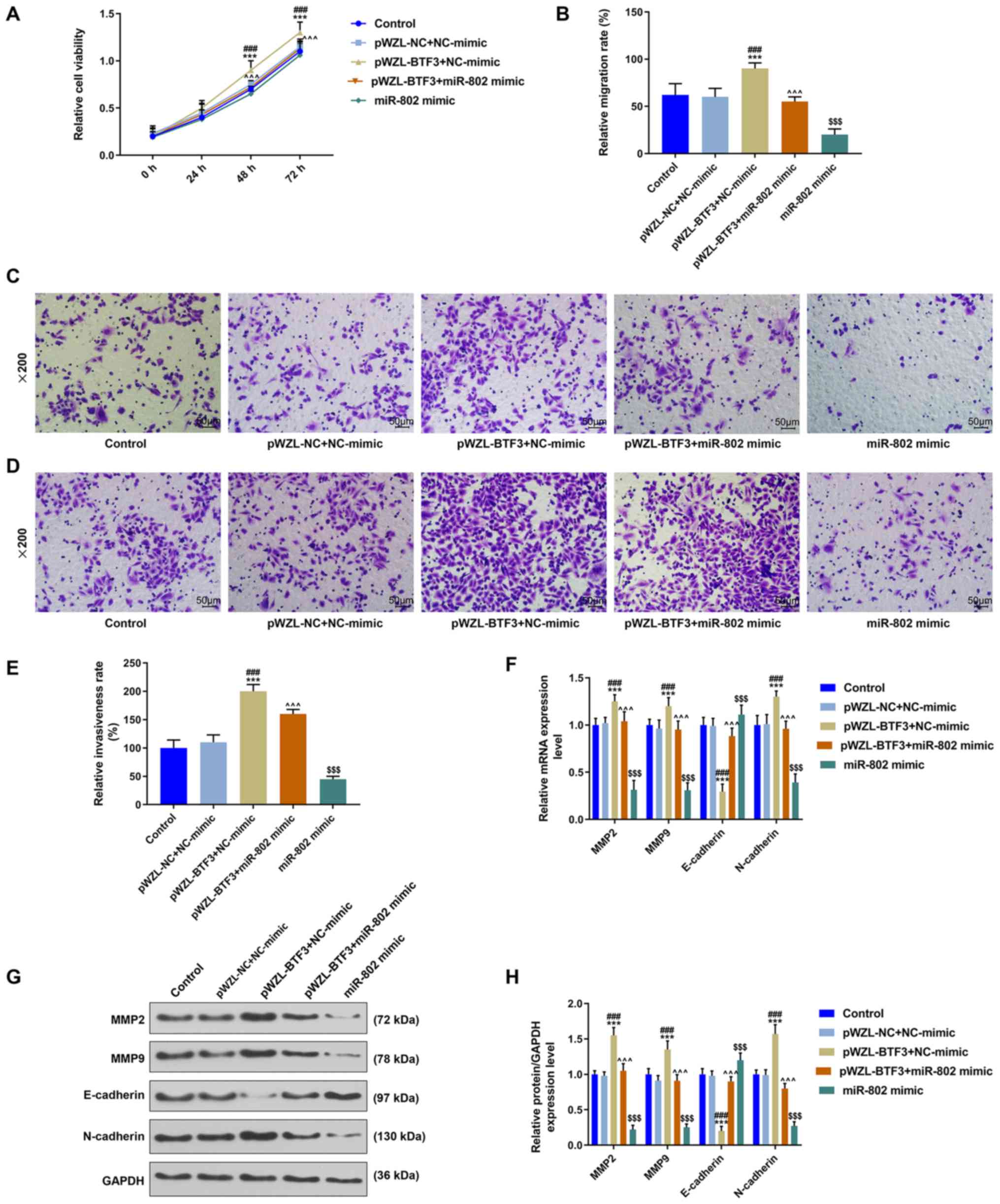|
1
|
Fang J, Zhang H and Jin S: Epigenetics and
cervical cancer: From pathogenesis to therapy. Tumour Biol.
35:5083–5093. 2014. View Article : Google Scholar : PubMed/NCBI
|
|
2
|
Dehn D, Torkko KC and Shroyer KR: Human
papillomavirus testing and molecular markers of cervical dysplasia
and carcinoma. Cancer. 111:1–14. 2007. View Article : Google Scholar : PubMed/NCBI
|
|
3
|
Sun XL, Wang HB, Wang ZQ, Cao TT, Yang X,
Han JS, Wu YF, Reilly KH and Wang JL: Effect of transcutaneous
electrical stimulation treatment on lower urinary tract symptoms
after class III radical hysterectomy in cervical cancer patients:
Study protocol for a multicentre, randomized controlled trial. BMC
Cancer. 17:4162017. View Article : Google Scholar : PubMed/NCBI
|
|
4
|
Kazumoto T, Kato S, Yokota H, Hasumi Y,
Kino N, Horie K, Yoshida D, Mizukami T and Saito Y: Is a low dose
of concomitant chemotherapy with extended-field radiotherapy
acceptable as an efficient treatment for cervical cancer patients
with metastases to the para-aortic lymph nodes? Int J Gynecol
Cancer. 21:1465–1471. 2011. View Article : Google Scholar : PubMed/NCBI
|
|
5
|
Xue M, Zhuo Y and Shan B: MicroRNAs, long
noncoding RNAs, and their functions in human disease. Methods Mol
Biol. 1617:1–25. 2017. View Article : Google Scholar : PubMed/NCBI
|
|
6
|
Mannucci C, Casciaro M, Minciullo PL,
Calapai G, Navarra M and Gangemi S: Involvement of microRNAs in
skin disorders: A literature review. Allergy Asthma Proc. 38:9–15.
2017. View Article : Google Scholar : PubMed/NCBI
|
|
7
|
Song Z and Li G: Role of specific
microRNAs in regulation of vascular smooth muscle cell
differentiation and the response to injury. J Cardiovasc Transl
Res. 3:246–250. 2010. View Article : Google Scholar : PubMed/NCBI
|
|
8
|
Singh RP, Massachi I, Manickavel S, Singh
S, Rao NP, Hasan S, Mc Curdy DK, Sharma S, Wong D, Hahn BH, et al:
The role of miRNA in inflammation and autoimmunity. Autoimmun Rev.
12:1160–1165. 2013. View Article : Google Scholar : PubMed/NCBI
|
|
9
|
Xu YF, Mao YP, Li YQ, Ren XY, He QM, Tang
XR, Sun Y, Liu N and Ma J: MicroRNA-93 promotes cell growth and
invasion in nasopharyngeal carcinoma by targeting disabled
homolog-2. Cancer Lett. 363:146–155. 2015. View Article : Google Scholar : PubMed/NCBI
|
|
10
|
Paul P, Chakraborty A, Sarkar D, Langthasa
M, Rahman M, Bari M, Singha RS, Malakar AK and Chakraborty S:
Interplay between miRNAs and human diseases. J Cell Physiol.
233:2007–2018. 2018. View Article : Google Scholar : PubMed/NCBI
|
|
11
|
Chen YL, Xu QP, Guo F and Guan WH:
MicroRNA-302d downregulates TGFBR2 expression and promotes
hepatocellular carcinoma growth and invasion. Exp Ther Med.
13:681–687. 2017. View Article : Google Scholar : PubMed/NCBI
|
|
12
|
Wang F, Liu J, Zou Y, Jiao Y, Huang Y, Fan
L, Li X, Yu H, He C, Wei W, et al: MicroRNA-143-3p, up-regulated in
H. pylori-positive gastric cancer, suppresses tumor growth,
migration and invasion by directly targeting AKT2. Oncotarget.
8:28711–28724. 2017. View Article : Google Scholar : PubMed/NCBI
|
|
13
|
Li N and Qin ZB: Inflammation-induced
miR-802 promotes cell proliferation in cholesteatoma. Biotechnol
Lett. 36:1753–1759. 2014. View Article : Google Scholar : PubMed/NCBI
|
|
14
|
Zhang XY, Mu JH, Liu LY and Zhang HZ:
Upregulation of miR-802 suppresses gastric cancer oncogenicity via
targeting RAB23 expression. Eur Rev Med Pharmacol Sci.
21:4071–4078. 2017.PubMed/NCBI
|
|
15
|
Zhang Q, Lv R, Guo W and Li X:
microRNA-802 inhibits cell proliferation and induces apoptosis in
human cervical cancer by targeting serine/arginine-rich splicing
factor 9. J Cell Biochem. 120:10370–10379. 2019. View Article : Google Scholar : PubMed/NCBI
|
|
16
|
Delfino KR and Rodriguez-Zas SL:
Transcription factor-microRNA-target gene networks associated with
ovarian cancer survival and recurrence. PLoS One. 8:e586082013.
View Article : Google Scholar : PubMed/NCBI
|
|
17
|
Zhou W, Wang Y, Wu R, He Y, Su Q and Shi
G: MicroRNA-488 and −920 regulate the production of proinflammatory
cytokines in acute gouty arthritis. Arthritis Res Ther. 19:2032017.
View Article : Google Scholar : PubMed/NCBI
|
|
18
|
Hu J, Ni S, Cao Y, Zhang T, Wu T, Yin X,
Lang Y and Lu H: The angiogenic effect of microRNA-21 targeting
TIMP3 through the regulation of MMP2 and MMP9. PLoS One.
11:e01495372016. View Article : Google Scholar : PubMed/NCBI
|
|
19
|
Liu GW, Qin ZM and Shen QH: An ensemble
method integrated with miRNA expression data for predicting miRNA
targets in stomach adenocarcinoma. Cancer Biomark. 20:617–625.
2017. View Article : Google Scholar : PubMed/NCBI
|
|
20
|
Li Y, Cai B, Shen L, Dong Y, Lu Q, Sun S,
Liu S, Ma S, Ma PX and Chen J: MiRNA-29b suppresses tumor growth
through simultaneously inhibiting angiogenesis and tumorigenesis by
targeting Akt3. Cancer Lett. 397:111–119. 2017. View Article : Google Scholar : PubMed/NCBI
|
|
21
|
Livak KJ and Schmittgen TD: Analysis of
relative gene expression data using real-time quantitative PCR and
the 2(-Delta Delta C(T)) Method. Methods. 25:402–408. 2001.
View Article : Google Scholar : PubMed/NCBI
|
|
22
|
Cakmak B and Köseoğlu DR: Comparison of
cervical cytological screening results between postmenopausal and
elderly women. Turk Patoloji Derg. 30:38–42. 2014.PubMed/NCBI
|
|
23
|
Cordeiro MN, De Lima RCP, Paolini F, Melo
ARDS, Campos APF, Venuti A and De Freitas AC: Current research into
novel therapeutic vaccines against cervical cancer. Expert Rev
Anticancer Ther. 18:365–376. 2018. View Article : Google Scholar : PubMed/NCBI
|
|
24
|
Favero G, Pierobon J, Genta ML, Araujo MP,
Miglino G, Del Carmen Pilar Diz M, de Andrade Carvalho H, Fukushima
JT, Baracat EC and Carvalho JP: Laparoscopic extrafascial
hysterectomy (completion surgery) after primary chemoradiation in
patients with locally advanced cervical cancer: technical aspects
and operative outcomes. Int J Gynecol Cancer. 24:608–614. 2014.
View Article : Google Scholar : PubMed/NCBI
|
|
25
|
Yuan F and Wang W: MicroRNA-802 suppresses
breast cancer proliferation through downregulation of FoxM1. Mol
Med Rep. 12:4647–4651. 2015. View Article : Google Scholar : PubMed/NCBI
|
|
26
|
Wu X, Gong Z, Sun L, Ma L and Wang Q:
MicroRNA-802 plays a tumour suppressive role in tongue squamous
cell carcinoma through directly targeting MAP2K4. Cell Prolif.
50:502017. View Article : Google Scholar
|
|
27
|
Cao ZQ, Shen Z and Huang WY: MicroRNA-802
promotes osteosarcoma cell proliferation by targeting p27. Asian
Pac J Cancer Prev. 14:7081–7084. 2013. View Article : Google Scholar : PubMed/NCBI
|
|
28
|
Wang LQ, Chen G, Liu XY, Liu FY, Jiang SY
and Wang Z: microRNA-802 promotes lung carcinoma proliferation by
targeting the tumor suppressor menin. Mol Med Rep. 10:1537–1542.
2014. View Article : Google Scholar : PubMed/NCBI
|
|
29
|
Symes AJ, Eilertsen M, Millar M, Nariculam
J, Freeman A, Notara M, Feneley MR, Patel HR, Masters JR and Ahmed
A: Quantitative analysis of BTF3, HINT1, NDRG1 and ODC1 protein
over-expression in human prostate cancer tissue. PLoS One.
8:e842952013. View Article : Google Scholar : PubMed/NCBI
|
|
30
|
Wang CJ, Frånbergh-Karlson H, Wang DW,
Arbman G, Zhang H and Sun XF: Clinicopathological significance of
BTF3 expression in colorectal cancer. Tumour Biol. 34:2141–2146.
2013. View Article : Google Scholar : PubMed/NCBI
|
|
31
|
Ding J, Wang X, Zhang Y, Sang X, Yi J, Liu
C, Liu Z, Wang M, Zhang N, Xue Y, et al: Inhibition of BTF3
sensitizes luminal breast cancer cells to PI3Kα inhibition through
the transcriptional regulation of ERα. Cancer Lett 440–441. 54–63.
2019. View Article : Google Scholar
|
|
32
|
Zhang Y, Gross N, Li Z, Yin G, Zhong Q,
Liu C and Huang Z: Upregulation of BTF3 affects the proliferation,
apoptosis, and cell cycle regulation in hypopharyngeal squamous
cell carcinoma. Biomed Pharmacother. 118:1092112019. View Article : Google Scholar : PubMed/NCBI
|
|
33
|
Hu J, Sun F, Chen W, Zhang J, Zhang T, Qi
M, Feng T, Liu H, Li X, Xing Y, et al: BTF3 sustains cancer
stem-like phenotype of prostate cancer via stabilization of BMI1. J
Exp Clin Cancer Res. 38:2272019. View Article : Google Scholar : PubMed/NCBI
|
|
34
|
Hanahan D and Weinberg RA: Hallmarks of
cancer: The next generation. Cell. 144:646–674. 2011. View Article : Google Scholar : PubMed/NCBI
|
|
35
|
Qureshi R, Arora H and Rizvi MA: EMT in
cervical cancer: Its role in tumour progression and response to
therapy. Cancer Lett 356 (2 Pt B). 321–331. 2015. View Article : Google Scholar
|
|
36
|
Sathyanarayanan A, Chandrasekaran KS and
Karunagaran D: microRNA-145 modulates epithelial-mesenchymal
transition and suppresses proliferation, migration and invasion by
targeting SIP1 in human cervical cancer cells. Cell Oncol (Dordr).
40:119–131. 2017. View Article : Google Scholar : PubMed/NCBI
|
|
37
|
Cheng Y, Yang M and Peng J: Correlation
the between the regulation of miRNA-1 in c-Met-induced EMT and
cervical cancer progression. Oncol Lett. 17:3341–3349.
2019.PubMed/NCBI
|
|
38
|
Zhang DZ, Chen BH, Zhang LF, Cheng MK,
Fang XJ and Wu XJ: Basic transcription factor 3 is required for
proliferation and epithelial-mesenchymal transition via regulation
of FOXM1 and JAK2/STAT3 signaling in gastric cancer. Oncol Res.
25:1453–1462. 2017. View Article : Google Scholar : PubMed/NCBI
|
|
39
|
Liu H, Zeng Z, Wang S, Li T, Mastriani E,
Li QH, Bao HX, Zhou YJ, Wang X, Liu Y, et al: Main components of
pomegranate, ellagic acid and luteolin, inhibit metastasis of
ovarian cancer by down-regulating MMP2 and MMP9. Cancer Biol Ther.
18:990–999. 2017. View Article : Google Scholar : PubMed/NCBI
|


















